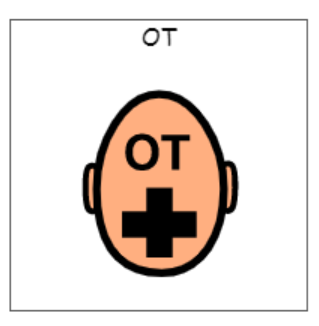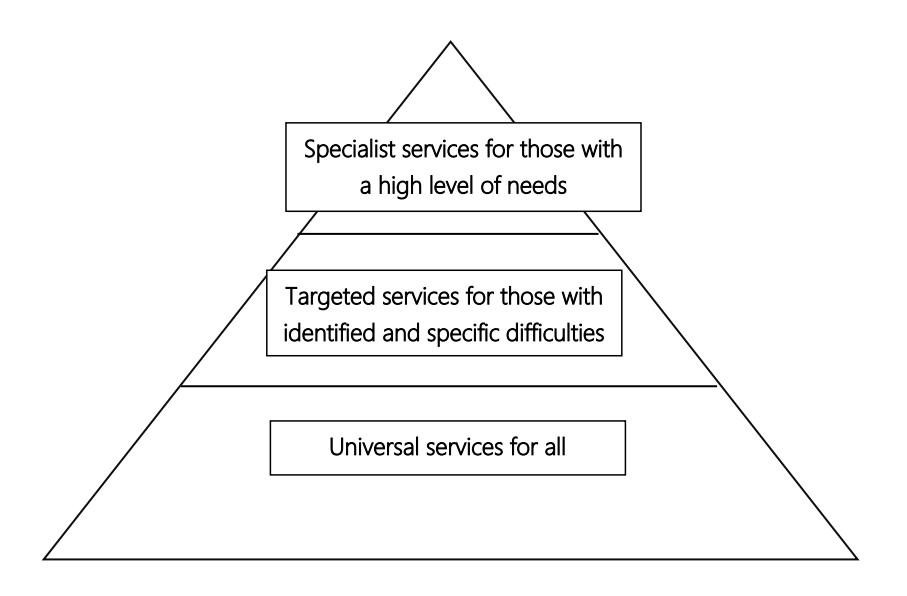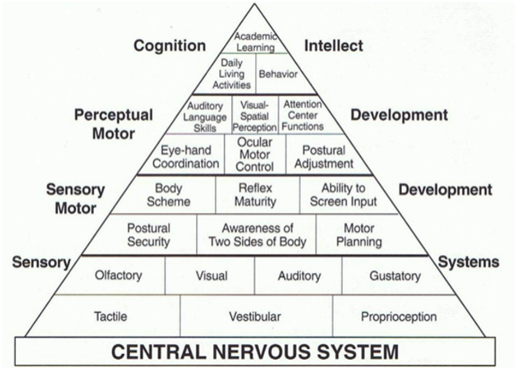Shine Occupational Therapy Provision at Green Lane School
At Green Lane school, it is recognised that school plays an essential role, not just in achieving academic outcomes, but also in identifying and addressing barriers to learning that pupils may face; supporting them to meet developmental milestones; and equipping them with a variety of independent life skills. To effectively address these non-academic outcomes, Shine Occupational Therapy works within the school providing both consultancy, to embed whole-school approaches, and specialist therapeutic interventions, to support individual pupils with their additional needs.
The Balanced System® Approach
Occupational Therapy provision at Green Lane school will be delivered across 3 distinct tiers of therapy provision: universal, targeted, and specialist.
What is Occupational Therapy?
An Occupational Therapist is based on site at Green Lane School. The OT service aims to provide advice that supports young people across both their home and school environment. Occupational Therapists support young people in participating in activities of daily living to help them to achieve their maximum level of independence. OT support with: sensory needs, independence skills, fine and gross motor skills, restrictive eating, emotional regulation, self-care tasks as well as support in unpicking the functions underlying any behaviours of concern.
If it is felt that your young person will benefit from strategies related to any of the areas mentioned above, please notify their class teacher. A consent form will then be sent home for you to complete. Once OT receive this back, we are able to commence our assessment process and provide accompanying recommendations.
Sensory Processing
Sensory integration refers to the processing, integration, and organisation of sensory information from the body and the environment. Effective sensory processing is fundamental to our wider skill development. As shown in the figure below, our sensory systems are foundation blocks. If one or more of these foundation blocks are not working as they should, it becomes difficult to acquire those skills at higher levels, or if acquired, for them to work efficiently. OT’s are able to provide advice regarding the sensory needs of young people, for further information please notify your young person’s class teacher.
Handwriting
Some young people may struggle with their handwriting due to various reasons. Some possible reasons include difficulties with motor skills, challenges remaining in a regulated state, muscle weakness and/or visual processing differences. The OT will work to unpick the young persons difficulties and provide strategies in accordance with this.
Restrictive Eating
The OT service is also able to provide advice regarding restrictive eating. Some young people have a limited number of foods within their diet, have aversions to specific foods and/or have difficulty with their oral motor skills. OT are able to provide advice inline with the young person’s identified areas of difficulty to help support with feeding.
Self-care and Independence Skills
For some young people, tasks such as washing and dressing themselves may be challenging to complete without adult support. This could be due to challenges around fine motor skills or the sequencing of the task. Once the area of difficulty is identified by OT, strategies can then be provided to help support the young person’s independence with tasks.
Emotional Regulation
Managing our emotions can be challenging at times, some young people may benefit from support in recognising their emotions and help in accessing regulatory strategies in response to this. OT are able to provide advice around emotional regulation programmes that may be beneficial to young people and other ways that supporting adults can help individuals with understanding and managing their emotions.
Occupational Therapy Provision at Green Lane School
Sensory Integration
Universal:
• All staff have received training on what sensory processing is, as well as sensory lifestyle’s, by an Advanced Practitioner in sensory integration.
• Dedicated education support teams can engage with ongoing coaching and support delivered by the OT during observation assessments and support sessions whilst in their individual classrooms.
• Occupational Therapy is currently working towards helping promote a whole school sensory-friendly environment. As part of this process the school environment is regularly evaluated, and advice and guidance provided around environmental adaptions required. Classes are also being provided with a toolkit of specialist sensory resources and equipment that will aid sensory regulation specific to their environment and the needs of the young people that they support.
• Sensory circuits are completed across the whole school, in classes or on a 1-1 basis and are available to all pupils as required.
Targeted:
• Modelling and ongoing coaching and support is provided to dedicated education support team’s who take responsibility for supporting individuals who have received OT assessment and personalised sensory lifestyle (diet) plan.
• Sensory equipment is provided to class teams in accordance with their pupil’s sensory report / lifestyle recommendations.
Specialist:
• Identified pupils receive specialist assessment from an OT trained in sensory integration principles in order to identify their individual sensory processing difficulties and preferences.
• The OT develops personalised sensory lifestyle’s (diets) on the basis of this assessment. These lifestyles (diets) are then implemented each day by the dedicated education support teams thereby using a targeted delivery approach (see above) to create a sensory lifestyle for the young person.
Motor Skill Development (including Handwriting)
Whether it’s using various gross motor skills to participate in physical education and playground activities with peers, or applying a range of fine motor skills for handwriting, using cutlery, or tying shoelaces, well-developed motor skills are an important aspect of achievement at school. Occupational therapy service provision will focus on addressing pupil’s difficulties with planning, organising, sequencing, and executing motor movements. These difficulties are often particularly prevalent where there are also sensory processing difficulties.
Addressing Feeding Difficulties
For some children and young people (particularly those with sensory processing difficulties) the self care skill of eating and drinking can be a particular challenge and may lead to significant concerns regarding adequate nutrition. Occupational therapy service provision will focus on assessing the underlying reasons for these difficulties, identifying need for input from other health care professionals, and, where appropriate, developing, and leading intervention plans.




